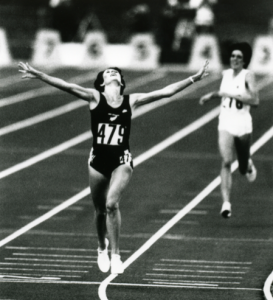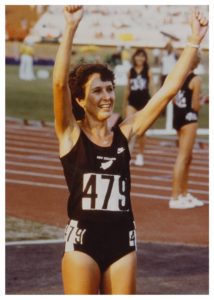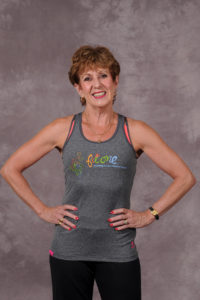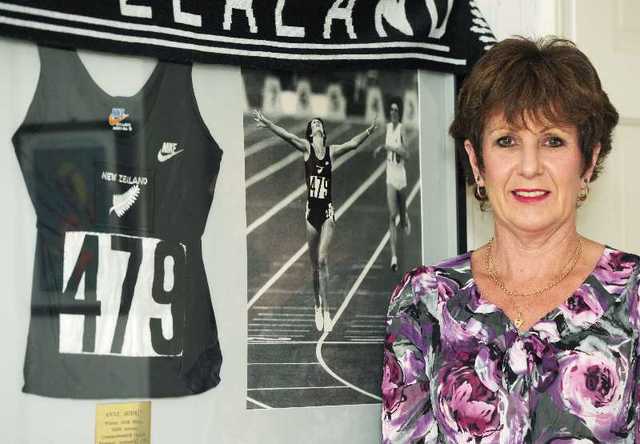
QK: I grew up during the 80’s, I don’t remember athletics being too main stream, but I have clear memories of you being a household name with the results you achieved on the US Road Running circuit and performances at the Olympics and Commonwealth Games. Is there any particular performance that stands out in your mind and for what reasons?
AA: You are correct I did have a long and successful career but the race that defined me was the Commonwealth Gold in 3000m Brisbane 1982. I changed coaches at the end of 1980- when I was at the lowest point ever due to an abusive coach, Olympic boycott , health and weight issues.I asked John Davies to coach me and when he said yes it changed my running future completely. He installed confidence through a training program based on consistency. I never wanted to go to Brisbane as was already running the USA road circuit but in March of 1982 he persuaded me to try and break the 5000m WR which I did in the first time I ever raced the distance. He then told me I could win Gold in Brisbane and I finally believed him and lined up! I was the first NZ woman to win a Gold on the track and remain the only one still.
QK: You were at the forefront of gender equality in athletics and competed in both the inaugural women’s Olympic marathon and inaugural women’s Olympic 10,000m, as well as these achievements you were also the first professional female distance runner. As a female athlete over this period how did this make you feel?
AA: When I took the stand to turn professional the sport immediately made prize-money equal for male and female runners which was not the case in other professional sports so that was important. I would have liked to see the 3000m, 5000m added to the Olympics sooner than they were. The marathon was added in 84, the 10,000m in 88 and the 5000m in 96. All that said I think that stand in 1981 not only changed my life and my sport but ultimately turned the Olympic Games open to professionals.So many female athletes following have had professional careers in sport due to a small group of road racers taking what then was a big risk. I was banned for 14 months by the IAAF but USA race directors still allowed me to compete here thankfully!
 QK: You are the ‘winningest road racer in history’ regardless of gender. In the 1980’s you won over 60% of your race starts and finished on the podium over 90% of the time. You qualified for every Olympic games from 1972 in Munich to 1992 in Barcelona, you won Commonwealth Games medals in 1982 in Brisbane and in 1986 in Edinborough, you set multiple New Zealand records and also a world record over 5,000m. You have been awarded an MBE and inducted into both the Running USA Hall of Champions and the New Zealand Sports Hall of Fame. Which of your achievements and accolades has been the most significant and for what reason?
QK: You are the ‘winningest road racer in history’ regardless of gender. In the 1980’s you won over 60% of your race starts and finished on the podium over 90% of the time. You qualified for every Olympic games from 1972 in Munich to 1992 in Barcelona, you won Commonwealth Games medals in 1982 in Brisbane and in 1986 in Edinborough, you set multiple New Zealand records and also a world record over 5,000m. You have been awarded an MBE and inducted into both the Running USA Hall of Champions and the New Zealand Sports Hall of Fame. Which of your achievements and accolades has been the most significant and for what reason?
AA: I would say the NZ Sports Hall of Fame as it is difficult to get into. It encompasses all sports not just running and as NZ celebrates a huge sporting history it’s an honor to be included with so many greats! That said to say you are in 3 HOF’s in 2 countries is quite nice too. In 2014 I was inducted into the Road Runners Clubs of America HOF Add the MBE and I think I might be unique!
QK: Along with Murray Halberg you over came some serious medical issues just to become an athlete. Although your running careers didn’t over lap much, New Zealand is a small country. Did you draw inspiration from his story or discuss your similarities with him?
AA: I never really followed Murray but instead Peter Snell our multi Olympic Gold medalist and World Record holder.Track and Field clubs were substantial in NZ communities and once I had had my feet reconstruction surgery done at age 13 years I wanted to be like all the other kids in my neighbourhood and join a club!
QK: During your extensive athletic career, who were your mentors? Who guided you and developed you as an athlete?
AA: As I said I believe if I had not asked John Davies to coach me we wouldn’t be having this conversation. I was a talented young athlete but my first coach only took me so far. Even though that meant the Olympics, Commonwealth Games and World XC under him , it was John who took me to the very top!
QK: What is your favourite run interval session?
AA: John was a firm believer in hill repeats and long runs over hilly terrain. That built my strength for every thing else I did in his program. My longest interval session was 3 times 1000m which would surprise many . He kept me at the shorter distances for interval sessions to maintain my natural speed. He kept workouts simple and consistent so I could monitor my progress.

QK: What have you learned over the last 12 months that more people should know?
AA: Well I am now 60 years old and try to run daily. I am healthy -fingers crossed- but keep my distance to 4 miles a day and 8 miles on Sunday. I don’t race or “train” just enjoy the health and fitness aspect of getting outside and sweating. I still love to run so am trying to do everything possible to stay off a bike or out of a pool! I also include weights for overall strengthening .
QK: What are the two biggest training mistakes you have made and how have you come back from them?
AA: Many mistakes under my first coach, too many to list, but under John we nailed it I think. The only decision that I would reconsider was running the 4 marathons I did. They weren’t good for my feet and thankfully I came to my senses and stopped. I think that is why I am still running healthy now.
QK: Thanks for your time Anne. I appreciate it.
